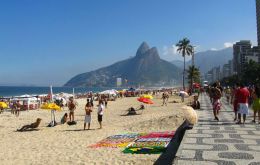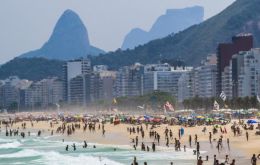MercoPress. South Atlantic News Agency
Tag: Rio de Janeiro
-
Friday, April 23rd 2021 - 04:38 UTC
Brazil, Judge orders beaches and bars of Rio de Janeiro must go back to business as usual

The beaches of Rio de Janeiro were allowed to start welcoming visitors again since Wednesday, following a court order which found Mayor Eduardo Paes' ban was unconstitutional.
-
Friday, April 9th 2021 - 10:38 UTC
Anti-covid measures lightened in Rio de Janeiro

Starting this Friday, restrictive measures imposed a week ago as a part of the local authorities in the Brazilian state of Rio de Janeiro's strategy against the spread of the coronavirus pandemic are to be lightened, it was announced.
-
Wednesday, April 7th 2021 - 09:01 UTC
Rio de Janeiro lawmakers now against renaming Maracana stadium after Pele to focus on covid-19 fight

The Legislative Assembly of the Brazilian state of Rio de Janeiro (Alert) Tuesday decided to go back on its steps and drop the initiative to rename the iconic Maracana stadium after football legend Pelé.
-
Saturday, March 20th 2021 - 09:17 UTC
Rio beaches closed for the weekend and no tourists allowed into the city

Rio de Janeiro closed its famed beaches on Friday in a bid to contain a surge of COVID-19, a move criticized by anti-lockdown President Jair Bolsonaro, who said sun-deprived citizens risked a lack of vitamin D.
-
Wednesday, March 10th 2021 - 08:00 UTC
Rio's iconic Maracaná stadium to be named Rei Pelé

Brazil’s world-famous Maracana stadium is to get a new name after the Rio de Janeiro state legislature voted on Tuesday to change its official title to the Edson Arantes do Nascimento – Rei Pele stadium.
-
Friday, February 19th 2021 - 08:58 UTC
Brazilian police investigating “shots of air” instead of Covid-19 vaccines

Rio de Janeiro's police launched an investigation into reports that doses of the coronavirus vaccine may have been diverted after images emerged of healthcare workers sticking needles into elderly people without injecting them.
-
Wednesday, February 17th 2021 - 08:42 UTC
Brazilian city suspends vaccination campaign because of insufficient doses

Rio de Janeiro suspends Covid-19 vaccination campaign until next week because the Brazilian city has run out of doses, Mayor Eduardo Paes announced. “I have been informed that the new doses did not arrive. We will have to interrupt our campaign from Tuesday,” Paes wrote on Twitter.
-
Tuesday, February 2nd 2021 - 08:54 UTC
Petrobras strikes oil in the pre-salt Campos Basin offshore Rio de Janeiro

Brazil's oil and gas giant Petrobras announced a hydrocarbon discovery in the pre-salt Campos Basin offshore Rio de Janeiro state, some 200 kilometers from the coast and at a depth of 2,950 meters.
-
Wednesday, January 6th 2021 - 09:42 UTC
Brazil's deadly police kills a Black man; daughter accuses government of “killing poor people”

Crowds gathered on Tuesday in a Rio de Janeiro cemetery to bury Marcelo Guimarães, the latest victim to be killed by police in Brazil, home to some of the world's deadliest security forces.
-
Tuesday, December 15th 2020 - 21:57 UTC
US latest attack submarine visits Brazil for the incorporation of three Scorpone class submersibles

The Virginia-class fast-attack submarine USS Vermont (SSN 792) is operating in the US 4th Fleet area of operations and conducted a brief stop for logistics in Rio de Janeiro December 10-15.
